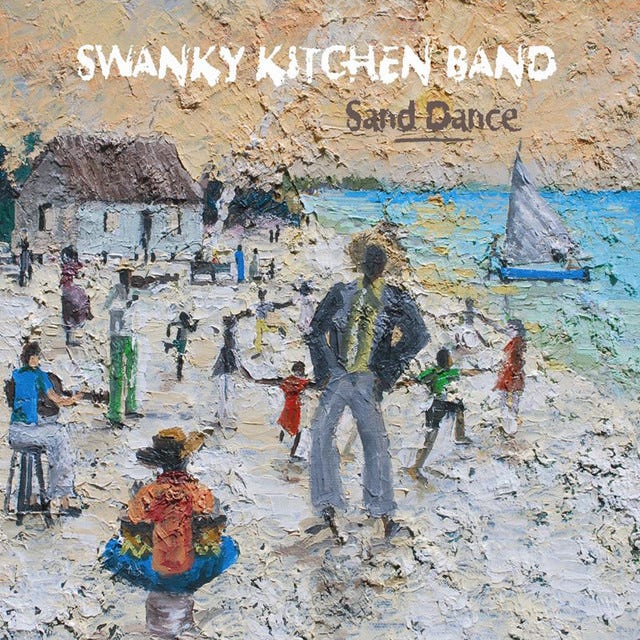EVERY GENRE PROJECT - September 23 - Kitchen Dance Music
Genre of the Day - Kitchen Dance Music 🇰🇾
Album of the Day - Sand Dance by Swanky Kitchen Band (2011)
The kitchen as a cornucopia acts as the focal point of a home. It’s a gathering center, the wellspring of nourishing meals that can act as vehicles to higher planes of joy and connection. In my house, populated by seven busy college students, it’s the place where we get to exchange brief snippets of our days and laugh together amidst the awkward dance of squeezing past each other in the disproportionately small space to grab a quick meal. In the tiny Cayman Islands, a tiny British Overseas Territory triangulated between Cuba and Jamaica, the kitchen transcends those typical connotations and acts as a musical center of celebration.
The Cayman Islands were for time immemorial populated mostly by caiman alligators and turtles later integral to its economy, unknown to humans until a stream of pirates and sailors spilled over from Jamaica beginning in the 1600s. Today the permanent population that gets to enjoy the near-comically idyllic islands only numbers less than 100,000 people, though it possesses nearly an equal amount of business registrations as one of the world’s most notorious and unsubtle tax havens. A deeper look into its social history helps uncover the unique phenomenon of kitchen dance music.
Caymanian kitchens were typically constructed to be separate, large, and open-air for fear of burning down the thatched roofs that typified the islands’ architecture while cooking up distinctive delicacies like turtle stew and conch-meat soup. Thus easily accessible to the community, kitchens became centers of celebrations and even for the transmission of pertinent news, such as ships’ arrivals. The Cayman Islands’ mixed population is largely descended from historical slave and sailor populations, whose musical ideas similarly mixed in these isolated and culinary settings. Those sailors had imported the fiddle as the central melodic driver of the music, and African rhythms and popular dances dating back to the times of slavery—an influence that reinforced the fiddle as the music’s leader, given its central position in much waltz and contradanza—provided a grooving anchor to the music’s idiosyncratic sound. Later Caribbean musical winds like Jamaican mento blew in the guitar as a harmonically denser counterpart to the fiddle’s soaring singularity. One cooking instrument does indeed function as a musical instrument—the grater adds rhythmic drive.
Swanky Kitchen Band dominates Google when you search up kitchen dance music, spearheading the music’s survival into the 21st-century as recordings have been few and far between. Their dedication to pouring the joy of Caymanian culture to the world is in their name; swanky is a national favorite drink, made from sour orange and brown sugar. Their 2011 Sand Dance waltzes its way from the kitchen to the shore. It’s rare to hear the rich and typically pastoral fiddle combined with such enwrapping, groove-driving guitar and sonically rich harmonica, but the eponymous intro displays this fantastical, uncommon blend wonderfully. Mixing as crisp and clear as the water lapping its white shores as the benefit of modern recording technology helps transport the listener directly to this rare tradition. Outside influence sometimes looms here, understandable given the cultural headwinds coming off of Jamaica and Cuba, like in the generalized Latin feel of “Munzie Boat in the Sound” or in the reggae instrumentation of “Floatin’.” “Turtlers’ Alphabet,” one of the few songs with lyrics, reveals a curious melancholic loneliness to historical Caymanian professions like turtle hunting in declaring “D stands for danger”, that the communal production of music centered on the kitchen would hope to alleviate. You can spend an entire intellectual life studying Americana or extolling the glories of China’s largesse, but studying what may seem infinitesimally small places reveal equally important understandings of human association and cultural development. To put it more pertinently, given the setting: let these musicians cook.
Footnote: Aunt Julia Hydes, a rare female drummer of kitchen dance music, still playing with immense precision as a centenarian.






